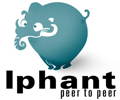This article's factual accuracy may be compromised due to out-of-date information.(September 2012) |
| Lphant | |
|---|---|
 | |
 Search results for Zeitgeist, the Movie on the Kad network | |
| Original author | Juanjo |
| Stable release | 3.51 (March 3, 2009) [±] |
| Written in | C# |
| Operating system | Microsoft Windows, Linux and Mac OS |
| Size | 2.8 MB |
| Available in | 19 languages[ citation needed ] |
| Type | Peer-to-peer file sharing |
| Licence | Freeware |
Lphant was a peer-to-peer file sharing client for the Microsoft Windows, Linux and Mac OS operating systems, [1] which supports the eDonkey Network and the BitTorrent protocol. [2] It was available in 19 languages. [3] The name and logo of the original Lphant application has been replicated in a program called "Lphant 6.0" (see Domain Name Acquisition).